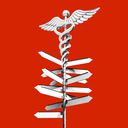Anti-abortion pregnancy centers are expanding in the post-Roe era

As abortion bans shutter clinics across the country, "crisis pregnancy centers" led by anti-abortion advocates see an opening to expand into the reproductive care void.
Why it matters: The centers, mostly nonprofits with religious affiliations, have generated comments and concern by appearing to offer medical services. Health providers and abortion rights advocates say they could further limit patients' ability to get accurate information and timely care in the post-Roe landscape.
The big picture: Health experts say the centers violate principles of medical ethics.
- The Charlotte Lozier Institute, an anti-abortion research organization, found that most of the centers' staff are not health professionals.
- A majority of the facilities do not have medical licenses, meaning they are largely exempt from regulations — including those that address the confidentiality of personal health information.
- Some centers have falsely claimed that abortion can lead to infertility, breast cancer, mental health issues and other conditions. These statements have been debunked.
- They also claim that medication abortion can be reversed, a concept which the American College of Obstetricians and Gynecologists says is "unproven and unethical," "not based on science" and can "compromise patient care and safety."
The most common services found at the centers are free pregnancy tests that can be obtained at drugstores, free maternity and baby supplies and "non-diagnostic" ultrasounds.
- A report from The Alliance: State Advocates for Women's Rights & Gender Equality found that these ultrasounds are done "to persuade clients to carry their pregnancies to term and falsely signal medical legitimacy," a practice that has been condemned by the American Institute of Ultrasound in Medicine.
By the numbers: There are approximately 3,000 crisis pregnancy centers located across the U.S., according to the Charlotte Lozier Institute.
- These centers outnumber abortion clinics 3 to 1 nationwide, and the ratio is expected to increase in the post-Roe era as clinics continue to shut down.
- The Center for Countering Digital Hate said in a June report that one in 10 Google searches for abortion services in states with "trigger" bans led users to crisis pregnancy centers.
What's happening: "I would not be surprised in the least" if crisis pregnancy centers "proliferate" in places where abortion clinics open and where the procedure remains legally protected, said Andrea Swartzendruber, an associate professor at the University of Georgia who studies the centers.
- The centers are also expanding in states that have restricted or banned abortion — at least 14 of which provide them with public funding through "Alternatives to Abortion" state programs.
- A 2020 study published in the journal JMIR Public Health and Surveillance found that "state funding was positively associated with a greater number of [crisis pregnancy centers] per state."
Zoom in: The Southwest Coalition for Life, an anti-abortion organization, announced in July that it is planning on opening a pregnancy center in New Mexico, an abortion rights state where the Mississippi clinic at the center of the U.S. Supreme Court case that overturned Roe v. Wade is relocating, along with other clinics.
- The organization said that the new center would be part of the Guiding Star Project network, an anti-abortion association with seven pregnancy centers that, after the fall of Roe, launched plans to open around 22 new centers in the next three to four years, said GSP president Lisa Strei.
Of note: Strei told Axios that this "aggressive expansion" is focused on states where abortion is criminalized to ensure that pregnancy centers in those places remain "relevant." She added that two GSP centers are currently "going through the process" of becoming medically licensed so that they can offer OB-GYN care.
- GSP would not offer abortion or contraception care, as it claims that they both "interrupt natural, healthy biological processes."
In Texas, where the state legislature last year approved $100 million of public funding for crisis pregnancy centers, the Pregnancy Center of the Coastal Bend is opening a $10 million, 20,000-square-foot facility near Texas A&M University's Corpus Christi campus to cater to female students, the Washington Post first reported.
- The facility will have counseling offices, sonogram rooms, a "man cave" with a pool table where men will be approached by marriage counselors, a coffee shop and two "boutique" shops, according to artist renderings. The center's director told the Post she could not afford to hire doctors.
What they're saying: "We've been growing for more than a decade pretty significantly," said Jor-El Godsey, president of Heartbeat International, a network of crisis pregnancy centers.
- He added that there are "efforts to open new pregnancy centers."
Between the lines: Some states that have banned or restricted abortion have the highest maternal mortality rates in the U.S. Additionally, many anti-abortion states are identified as having "maternity care deserts," which lack hospitals offering obstetric care, birth centers and no obstetric providers.
- Experts worry that in the post-Roe era, states that ban abortion will have a lack of health providers and patients could lose access to reproductive health services.
- Asked if pregnancy centers could respond by offering medical care, Godsey suggested that these concerns should be addressed by communities, states and the federal government.
- "That's a tall task to expect the pregnancy centers to accomplish," Godsey told Axios.
Health experts take issue with the way the centers portray their operations.
- A 2022 report in the International Journal of Women's Health said that the centers offer "inaccurate" medical information that delays "access to medically legitimate prenatal and abortion care, which negatively impacts maternal health."
Don't forget: The Supreme Court ruled in 2018 that crisis pregnancy centers are not required to give their clients information about how to end their pregnancies.
- The court also said that states cannot require these centers to disclose that they do not have licensed medical professionals on staff because it violates their First Amendment rights.